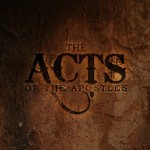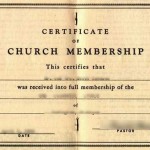Replay: I will build my charitable organization
Three years ago, I wrote a post called “I will build my charitable organization.” The post was a response to another very good post that I had read.
I wrote this post to encourage people to think about what Jesus meant when he said, “I will build my church.” Did he have in mind the things that we think about when we think about “church”? Some would say, “Yes,” but many would say, “No.”
So, what did Jesus mean? What do we mean today?
———————————–
“I will build my charitable organization”
Bill at “The Thin Edge” has written a very good post called “So Which 501(c)3 do you Attend?” The article is fairly short:
A sprawling campus is being developed on a hundred acres at the edge of a large suburban area, near the front entrance of a popular housing development with prices “starting in the low $300,000” bracket according to a sign erected by the property development company. Everyone’s wondering about this beautifully landscaped campus with its winding driveway, small lake, and ultra-modern structure of concrete and glass toward the rear of the property: is it a medical clinic? a health club? an exclusive restaurant? an advertising agency? an animal hospital? a bank? Whoever it was, they obviously had deep pockets and seemed to be sparing no expense to impress their upscale neighbors next door.
Finally, a sign appeared that read, “Coming Soon! Mountain View Church. Offering fresh perspectives on the timeless principles of Jesus Christ!” A church? They must have spent a small fortune on their logo-really cool-portraying mountains, a rushing mountain stream, and a cross. In small print at the bottom, it gave a little more information: “Mountain View Church, Inc. is a 501(c)3 corporation and a member of the Green Valley Baptist Association and the Southern Baptist Convention.” Looking up their founding documents online (through the state department’s searchable database), one will discover, sure enough, they are a bona fide company with officers, trustees, and articles of incorporation.
So is this really a “church” or just another corporation with a cool logo and trendy name? How are we supposed to know the difference? Are we trying to cross-pollinate a living organism with an organizational chart and marketing plan? Is that even desirable? When Jesus declared, “I will build My church,” is this what He had in mind? Or did we misinterpret the statement as “We will build His 501(c)3 ministry organization?”
Bill brings out some good points, but I’d like to use his post to ask a few other questions.
When we decided that we would have multiple elders (pastors) and that we would not choose one of those to be a “senior pastor” or “head elder”, several people asked, “So, who will I say is my pastor?”
When we decided to meet in a rented space on Sunday and in homes during the week, some people asked, “So, where will I say my church is?”
When we decided that we would not focus on programs but on relationships, some people asked, “But how will I serve or how will I be discipled?”
When we decided that individuals will be responsible for giving to those in need instead of giving to the church so that the church could do everything, some people asked, “So, will we still get a tax deduction?”
These are all very important questions, and I’m not trying to belittle anyone who has asked those questions. However, I would like to suggest that the questions indicate that we’re not thinking biblically about the church. Instead, we’re thinking organizationally and programmatically about the church.
Jesus is building his church – which is, his assembly of people – a group of people. When we begin to think of the church as more than or different than a group of Jesus followers, then we are thinking less and less about the church as described by Scripture.
It may be pragmatic and efficient and logical to have a human leader, and a set of programs, and a specific meeting place, and tax-deductible status. But, these things do not define the church. We could argue the benefits or the detriments of having these things, but they would be outside the scope of defining what (or WHO) the church is.
Jesus said that he would build his church… not his charitable organization. We would do well to remember that Jesus cares about his church, not our organizations and programs.
A blogger’s thoughts about the modern local church
Often, in my short noon posts, I link to a blog post written by another blogger. This time, I’m going to link to two different blog posts by the same blogger.
The blogger is Bobby from “Deconstructing Neverland.” And, I’m going to link to his posts in the reverse order that he published them… for a reason.
First, in his post called “What does local church look like?” Bobby admits that he does not agree with the way “local church” is usually defined and delineated today.
Next, in his post called “Trying something different,” talks about meeting with a local church. (The post is primarily about how the leaders of that church are trying a different, more participatory style of teaching.)
Now, put these two posts together. Bobby does not agree with how some of his brothers and sisters think about and live as the church. But, he wants to spend time with them (and DOES spend time with them) in spite of these differences.
What an AWESOME example of both blogging and LIVING as the church of God!
Guest Blogger: Sunday Morning Sucker Punch
I’ve invited several people to write “guest blog posts” for this blog. There are several reasons for this: 1) To offer different perspectives. 2) To generate even more discussion and conversation between blogs. 3) To introduce other bloggers to my readers.
(If you are interested in writing a guest blog post, please contact me at aknox[at]sebts[dot]com.)
Today’s post was written by Blake Sorensen.
—————————————
SUNDAY MORNING SUCKER PUNCH
It was a Sunday morning like any other. Sunshine blazing down out of the hot summer sky. My wife in her favorite jeans. Her hair in a ponytail. My two girls in the back seat were playing pretend with their stuffed animals. None of us had any idea what was about to come.
Dropped off the girls in the Kid Zone. Grabbed a cup of the designer coffee in the foyer and split a chocolate donut with my wife as the worship band was winding down. We slipped into our favorite row of seats near the middle and the pastor stepped up to microphone. The thunder began to rumble.
He clears his throat. Makes a lame joke about the worship band. Then he drops the bomb.
“God is doing a new thing with our church,” he says. Another conference? No. It’s worse.
“Next Sunday our congregation will become part of Hope Christian Church,” he says. I stop sipping my coffee.
Apparently, there are things that our church “has always wanted to do” but didn’t. Or couldn’t for some reason. Now, somehow, we have a chance to “be the church we were always wanting to be” – by merging with some other church I’ve barely heard of before.
So, that’s it? Our church history, our identity, our vision, our relationships, are just gone? Over?
Yes. It’s over. No vote. No warning. Just, “Thanks for investing your lives here. Now you’re all joining this other Church where I will now be on staff as their Associate Pastor. See you next week at that other place. Maps are in your bulletin. We know you’re gonna love it.”
But I don’t. I don’t love it. I hate it. I really, really hate this.
What if I don’t want to join that other church? What if some of us here want to stay together and continue to fellowship without you, pastor? Can we do that? Is that even an option?
Not in America. See, church in America is largely a franchise. It’s a business. And like most businesses in America today, things are not looking so good. The economy is still in free fall. There are still millions of hard working Americans who are hardly working – and working hard to find a job to put food on the table.
Because of these factors, the Church business is suffering. Less people are going to church on Sunday – and not because of anything to do with the economy, but essentially because the Church has become known more for what she opposes (gay marriage, abortion, increased taxes), and less for what she is in favor of (love, forgiveness, grace).
So, because less people are coming to the Church performance every Sunday morning, the offering plates are beginning to get lighter. This means it’s harder than ever to make payroll. Lesser pastors and staff get the boot first. Eventually, the church is left with just a lone senior pastor, a handful of unpaid volunteers, and a big, empty building which needs to be paid for. Of course, utilities, maintenance, security – these things cost money, and if your Church business isn’t bringing in the people, you’re probably not going to make your bill payments regularly.
What’s a business to do? Merge!
Now, any good business major will tell you that, in a merger, there’s a winner and a loser. One business loses all its identity as it becomes absorbed into the larger business. It’s how things work.
That same business major will also tell you that anytime a merger takes place it’s because both businesses are in financial stress. The larger business needs to quickly and artificially stimulate their talent pool and raise inventory. The weaker business needs someone to rescue them because they’re in over their heads and they need someone bigger and smarter to take the wheel.
Apparently our church was one of the weaker ones. We lost our identity. Like it or not, our church is dead and we must now warm the seats over at Hope Christian Church. At least until they end up merging with First Baptist down the street a few years from now.
I’ve started to notice lately that a lot of local churches have decided to merge with other churches to stay in business. A co-worker’s church is merging with another church too. At least his church is keeping their name, and their senior pastor. They’re even getting a new building out of the deal. No more leasing for them.
You know what really irks me, though? It’s that this business decision is twisted around as some kind of Divine revelation. My friend’s pastor told everyone that “God is leading us to join with this ‘Other Church’ because together we can do so much more!” Which is, of course, a flat out lie. The actual truth is that these pastors would never in a million years consider merging with another church if their bank accounts were bursting. No, the main reason these churches would ever even consider a merger in the first place is because the only other choice is to close their doors and go out of business.
What truly angers me most is how these pastors spin the story to their congregations. This is pure, unapologetic salesmanship, plain and simple. When they say to their flock, “God revealed to us that our two churches needed to come together to accomplish something wonderful in this city!” What they really mean is, “I was praying about whether to leave to find another, larger church to hire me, and then I met this other pastor who said he would not only hire me, but he’d love to take our dwindling members and double the size of his church overnight!”
The spin is: “This is a sudden, miraculous move of God!” and the truth is: “This is the only way I could keep my job!” and it frankly makes me a little sick.
I mean, aren’t pastors supposed to put the needs of the sheep over their own? Would it have been the end of the world for our pastor to get another job like the rest of us? Couldn’t he serve here as a volunteer? Are we only a real Church if he’s getting paid to preach every week?
I write this article out of frustration, and also out of sincere disgust. It really saddens me to see pastors more concerned for their paycheck than they are for the people at their church. So, when your pastor stands up on Sunday morning and without warning spins a story that essentially boils down to this: “The church you love is shutting down. You will now need to start attending this other church you never heard of before where I will now be on staff,” you’ll know that it was a great idea for your pastor and an “ok” idea for everyone else.
Maybe that’s how traditional churches will eventually disappear? One by one they will all be forced to merge together as they shrink down smaller and smaller. Eventually all the traditional churches in your town will be just one big church made up of former Lutherans, Presbyterians, Methodists, Charismatics, Baptists, and Non-denominational church members.
Actually, that sounds like a wonderful church, doesn’t it?
Maybe this really is a blessing in disguise?
-Blake Sorenson
Comment highlight: Hindering the church from being a greater witness to the world?
I want to highlight (what I think is) an awesome comment left by Scott on my post “The exclusivity of the modern local church.”
In that post, I had argued that the modern concept of “local church” tends to separate Christians from one another, such that we see each other as ekklesia (“church”) only when gathered within the context of that “local church” (but not a subset or with another group).
At the end of the post, I asked two questions. I’m not going to repeat them here, but Scott includes the questions in his comment.
Here is Scott’s comment:
Alan, you asked:
1. Do you agree or disagree with what I’ve written here?
Yes, I absolutely agree. The evidence in scripture for this kind of exclusivity is scant to non-existent. And if we think of the Christian faith in terms of a movement (which I think it is and was then) rather than an institution then this makes sense. Also, Jesus (in contrast to the religious leaders of his day) seems more inclusive than exclusive to me.
2. Regardless of whether you agree or disagree, what would happen to the church (ekklesia) if we treated the assembly (“church”) as less exclusive, as I’ve talked about here?
I think a beautiful thing would happen. The church would have a greater witness to the world! But as long as we have expensive buildings and salaried pastors (I am one so this is not stone throwing) it is likely to be impossible.
There is a reason for the exclusivity you describe. It is inherent to our practice of “church.” Our practice of church today creates a competitive and protective mindset that just can’t be ignored. We have too many obligations (debt, salaries, programs, membership rolls, etc) to provide for. There is a motive behind keeping it exclusive. It’s not right and I hate this (I struggle with it all the time), but it’s the way things are.
absolutely agree
What do you think? Is the exclusivity of the modern “local church” inherent in our practice of church today? Does our modern understanding of church create a competitive and protective mindset? How do we help one another move away from that, or should we?
The exclusivity of the modern local church
When I read about the ekklesia (“church” – or literally translated “assembly”) in Scripture, I get the sense that there is more fluidity and inclusiveness among the followers of Jesus than what we see today. Today, the idea of the “local church” tends to include only certain believers while excluding all others.
For example, imagine that there are four different “local churches” who own buildings that sit on the four corners of the intersections of two roads. Believers meet in those four buildings, and they each consider themselves a “local church.”
However, if several people from each of those four “local churches” met together, they would probably not consider themselves ekklesia (“church”) even if they met together regularly. (To be fair, even a subset from one of those “local churches” would not consider themselves “church” nor would they be considered “church” by the others, even if they met together regularly.)
(By the way, Eric at “A Pilgrim’s Progress” has started a good discussion concerning “small groups” which parallels this post in some ways. See his posts “Just like small groups? Not exactly” and “Why Small Groups?“)
In Scripture, I don’t perceive the same kind of exclusivity and limited use of the term ekklesia (“church”). Instead, while term ekklesia is applied to gatherings of believers who meet together regularly, it would seem strange for one of the authors to limit the use of ekklesia only to certain groups of believers meeting in certain locations at certain times under a specified organization/leadership – which is the way that the phrase “local church” is used today.
For example, in Romans 16, Paul addresses several groups of believers. He identifies them by several terms including ekklesia. (Romans 16:5) However, if some of the people from each of those groups got together, I would think that Paul would still use the term ekklesia to describe that assembly. In fact, if Paul was part of that group, he would then include himself as part of that ekklesia.
That sounds strange to many today because of the connotation that is often placed on the term “church” and especially the phrase “local church.” But, it doesn’t seem that the Greek term ekklesia carries that same baggage.
I’d love to hear your thoughts on a couple of questions:
1. Do you agree or disagree with what I’ve written here? Why?
2. Regardless of whether you agree or disagree, what would happen to the church (ekklesia) if we treated the assembly (“church”) as less exclusive, as I’ve talked about here?
The Ekklesia: the assembling of those in Christ
I enjoy reading John’s blog. His posts are always encouraging and usually stretch me in thinking about Jesus Christ. His latest post is no different: “Getting Reacquainted with the Ekklesia.”
At the beginning of the post, John explains why he has decided not to use the English term “church,” and instead to use the transliteration “ekklesia.” While I do continue to use the word “church,” I can certainly understand and appreciate his reasoning and decision.
The remainder of the post is a “fleshing” out, if you will, of the ekklesia, primarily as it refers to the body of Christ. For example, consider this excellent paragraph:
Another wonderful picture is given to us of this assembling of those in Christ, a picture of a body with a Head. The brothers and sisters have the living God by the Spirit dwelling in them and are “hidden with Christ in God” and not only that but Christ is now our life! (Col. 3:3-4) This body, when it gathers together with Christ as Head, is in truth assembling our Lord together. “Christ is the head of the ekklesia, his body, of which he is the Savior.” (Eph. 5:23) Every brother and sister must live by the life of Christ in the gathering, the ekklesia, in order for the fullness of the Lord to be assembled, for Christ to be made manifest in glory. He must be the Head, the Source, the King in her midst. The brothers and sisters “gather to eat” (1 Cor. 11:33) to feed on Christ, who is life. For “the Spirit gives life; the flesh counts for nothing.” (John 6:57,63) When “the whole ekklesia comes together” it is for the purpose of being “built up” to “be mutually encouraged by each other’s faith.” (1 Cor. 14:23,26; Rom. 1:12). This is following “the way of love.” (1 Cor. 14:1) It is loving one another by the life of Christ, according to the measure of the gift given to each. Each brother and sister freely functioning by the Spirit in them to one another, through one another; that is to say through Christ in them, to Christ in them, and for Christ in them. “In all of them and in everyone it is the same God at work.” (1 Cor. 12:6) So like a body which is assembled and works organically, hidden as it were, by the source of its head so to the body of Christ when it assembles functions organically by the spiritual life of Christ, its Source, its Head. And what is amazing is that the Father already sees the ekklesia already assembled with the Son as Head! The Father has already “placed all things under his feet and appointed him to be head over everything for the ekklesia, which is his body, the fullness of him who fills everything in every way.” (Eph. 1:22-23) So as the body assembles together we are in reality manifesting what the Father already sees assembled in His Son. As we assemble together may “we all reach unity in the faith and in the knowledge of the Son of God and become mature, attaining to the whole measure of the fullness of Christ.” (Eph. 4:13) Brothers and sisters the Lord has an assembled body in view not a disassembled body of believers. May we have such a view of the ekkelsia, His body.
I would echo John’s wish/prayer, “May we have such a view of the ekklesia, His body,” and then add, “And may we live among one another and the world as the ekklesia, His body.”
Thanks, John!
The church and our role among the brothers and sisters
Jonathan at “Jon’s Journey” has written many good posts. But, his last two posts are right on the mark.
In the first post, “Recognize Church,” he lists various common misconceptions concerning what defines the church… things like buildings, Sunday morning events, organization… and you could add leadership, or membership, or many other things.
So, what does define the church? What makes a group the church?
This is Jonathan’s answer:
Jesus talks simply of when two or three are gathered in His name. Church (ecclesia) was a word used to refer to an assembly or democratic gathering. We see in other New Testament passages the early believers also used the term church to refer to all the believers in a geographical area. So in my mind church is simply believers and whenever they get together.
The question then becomes: As the church, what do we do when we gather together with other brothers and sisters in Christ?
Jonathan answers this question in his next post “My Role with Church.”
He looks at several different passages of Scripture and concludes with this:
That the whole body works together, to build up the body to become mature and more like Christ. So that we can be Christ’s living body in our world today.
And I think that is the role for each of us as we get together with other believers (the church – whenever and wherever).
I think Jonathan is on to something with both of these posts. Instead of trying to distinguish ourselves from other Christians, what if we sought to help one another grow in maturity in Christ no matter who, when, and where we are meeting together?
The Church by Example in the Book of Acts
As Dave Black has mentioned on his blog (see his post from Friday, July 15, 2011 at 6:34 p.m.), he has asked me to teach the Book of Acts in his New Testament class. I’ve decided to title the lecture “The Church by Example in the Book of Acts.”
Obviously, I can’t cover the entire book in one 3 hour session. (In fact, I think I will only have about 2 hours or so, which further limits what I can teach.) So, I’ve decided to focus on the descriptions of the church that we read about in Acts, and perhaps briefly consider those descriptions in comparison to the church today.
(By the way, in case you didn’t know, our church also happens to be studying through the Book of Acts now. We just finished discussing Acts 10 together last Sunday, and we’ll cover Acts 11 next Sunday. I don’t think we’ll finish Acts before I’m scheduled to teach this class.)
As I think through the various ways the church is described in the Book of Acts, I also want to take into account the general tone of the book. Acts is primarily a book of actions (duh… it was called “Acts” for a reason). Because of this, I’m trying to use verbal descriptors (gerunds… words ending in “ing”).
So, here are some of the descriptions I’ve noticed so far (in no particular order):
In the Book of Acts, the church is…
- a going church
- a sending church
- a praying church
- an eating church
- a serving church
- a proclaiming church
- a suffering church
- a teaching church
- a sharing church
- a gathering church
- a growing/expanding/increasing church
On that last description, I haven’t decided which term I prefer.
(By the way, the descriptors above are actually categories. In most cases, several verbs fit within each descriptor and help us understand what the descriptor means. I’ll try to share more about that in a later post.)
What do you think about my descriptions of the church in the Book of Acts so far? What changes, additions, deletions would you make to my list?
Replay: Church members…
Five years ago, just after I started this blog, I wrote a post called “Church members…” I was just beginning to examine the common modern practice of church membership, and was beginning to recognize that this practice often works to separate from brothers and sisters from one another. I’ve written several other posts about being a member of the church since this post. You can check the category “members” if you’re interested in reading more.
————————————-
I’ve read several blogs recently concerning church membership and baptism. Most of the studies that I have read treat the subject from church history – especially baptist history. What happens when we study church membership from a biblical perspective? As I’ve studied various passages, a couple of questions come to mind:
1) How many churches are there? Certainly there are thousands of groups who call themselves a church. But, from God’s perspective, how many churches are there? I think there is only one.
2) How does someone become a member of that church? Scripturally, someone becomes a member of the church at the point of salvation – regeneration by the Holy Spirit.
If this is correct, and I’m open to listen to other suggestions, then when God commands us that “the members should have the same care for one another” (1 Cor 12:25), He is commanding us to care for all believers, not just those who happen to associate with the same local group as ourselves. When He commands us to love one another, serve one another, forgive one another, bear one another’s burdens, admonish one another, edify one another, and bear with one another, He is referring to our relationships to all members (i.e., all believers), not just those believers with whom we agree and meet regularly.
I understand that groups of believers associate together and call themselves a church. I understand that those believers then create membership requirements for their association. However, we must never blur the distinction between belonging to a local assocation of believers and being members of the church. Also, we must never assume that Scriptural mandates only apply to our local association.
When we ask the question, “Who is my neighbor (a member)?” is our answer as broad as God’s answer?
Do I want to recreate the first century church?
On this blog, I usually write about the church as they (church is a group of people, a collective, not an “it”) are described in the New Testament. Sometimes, when I talk to people in person – especially when someone wants to meet me for lunch or coffee or something like that for the first time – they want to talk about my understanding of the church.
Often, I’m asked a question like this: “So, do you want to see the first century church recreated today?”
And, my answer is always the same thing: “No. I think it would be impossible to recreate the first century church today.”
In fact, given my understanding of the church as people, I believe it would be impossible to recreate any other church at any other time, because people are constantly changing.
So, why am I so interested in comparing the church today to the church in the New Testament? Alan, it seems like you DO want to recreate the first century church.
Well, thanks for asking, Alan. I’ll try to explain.
In Scripture, we read about how God interacted with his church during that time period. We also read about how God’s people interacted with one another. We can read what various writers said about the importance of holding fast to certain types of interaction while, at the same time, staying away from other types of interaction.
You can think about the “one anothers” here if you want to. While there are primarily positive “one anothers” (i.e., love one another, build up one another, teach one another, serve one another, encourage one another, consider one another), there are also a few negative “one anothers” (i.e., do not devour one another, do not judge one another, do not provoke one another, do not envy one another). The question is not: “Are we showing love to one another in the same way that first century followers of Jesus Christ would show love to one another?” The question is: “Are we showing love to one another?”
In this way, we can use the examples, principles, and commands of Scripture (both the positive and negative versions) to compare our own lives together in Christ.
In Scripture – as I said before – we can see how God interacts with his people and how his people interact with one another. Is this the way that we are interacting with God and with one another? If not, the answer is not to return to the first century, but to examine which of our relationships (either with God or with one another) are skewed.
When I’m asked that question (you know, “Do you want to recreate the first century church today?”), I usually end my answer – similar to the answer above – with something like this:
The biggest problem in the modern church is not trying to recreate the first century church today. The biggest problem is projecting the modern church back onto the first century church.










